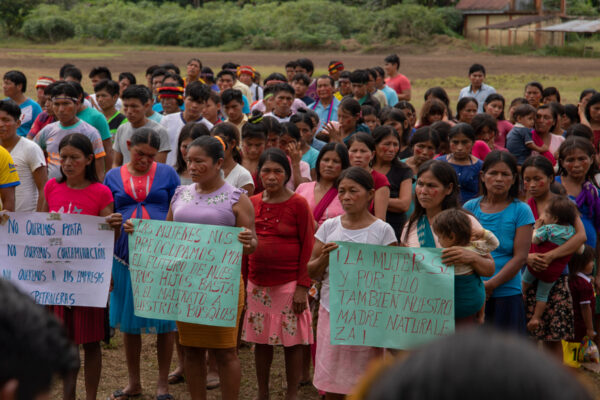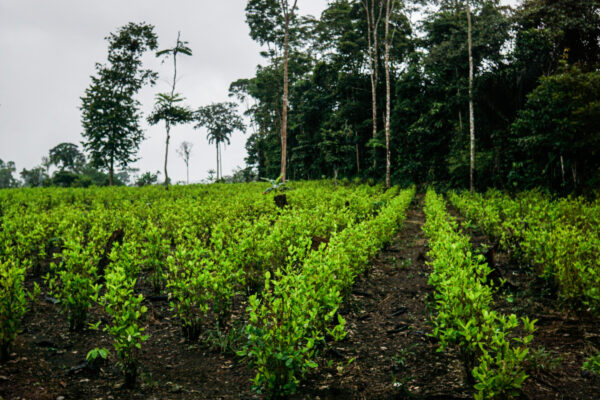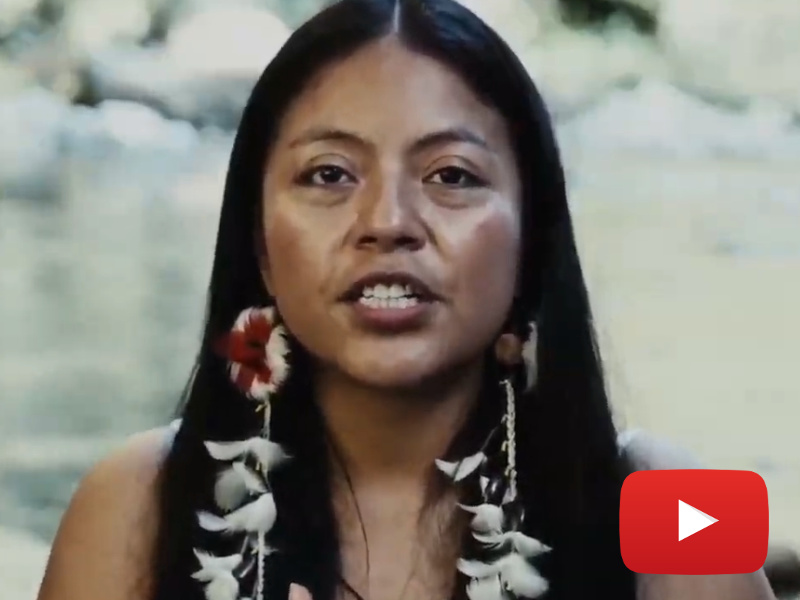September 17, 2008
Amy Davidsen
Director of Environmental Affairs
JPMorgan Chase
270 Park Avenue, Floor 29
New York, NY 10017
Dear Ms. Davidson,
Thank you for agreeing to speak with Amazon Watch this week about Ecopetrol’s Colombia operations. On September 12, 2008, the Colombian national oil company, Ecopetrol, registered 20 million American Depositary Shares, in filings with the Securities and Exchange Commission, and expects trading to being as early as Thursday, September 18. JPMorgan Chase Bank is listed as the underwriting institution.
For more than a decade, Amazon Watch has been closely monitoring the situation of Colombia’s U’wa indigenous people, who have steadfastly opposed all oil drilling on their sacred ancestral lands (Footnote 1: Controversy – Colombia’s U’wa indigenous people have expressed strong opposition to any oil operations within their ancestral territory, given their cosmological view of oil as the blood of mother Earth. Following a 7-year campaign, in 2002 Occidental Petroleum (OXY) pulled out of the oil project. The campaign also targeted OXY’s top shareholders including Fidelity Investments. After suffering 75 protests at its offices nationwide, Fidelity moved to sell $400 million in OXY shares. The campaign received extensive media coverage including a story on the front page of the Wall Street Journal. Shortly thereafter, rights to concessions in various blocks overlapping U’wa territory, notably the Sirirí and Catleya blocks, were transferred in full to Ecopetrol, which had previously shared ownership with Oxy.). We are concerned that Ecopetrol in its filings has misrepresented their treatment of indigenous communities in Colombia, particularly with the U’wa indigenous community. We also believe that Ecopetrol’s inadequate commitment to corporate social responsibility and specifically its poor handling of controversial projects within indigenous reserves and other sensitive areas will expose the company and its investors to significant financial and reputational risks. Therefore, the U’wa and Amazon Watch are calling on investors not to buy Ecopetrol shares. We believe that by underwriting shares of Ecopetrol, JPMorgan Chase is potentially violating some of the social and environmental standards, including the Equator Principles, to which your company adheres.
Ecopetrol’s filing with the SEC includes the following paragraph on the subject:
“We carry out and plan to carry out exploration and production activities in areas classified by the Government as indigenous reserves. We may not begin to explore for or produce hydrocarbons in these regions until we reach an agreement with the indigenous communities living on these lands. Generally these consultations last between four and six months, but may be significantly delayed if we cannot reach an agreement. For example, we conduct operations in areas of the Northeastern region which are inhabited by the U’wa community. Commencement of operations on two blocks in this region have been delayed for 16 years and seven years, respectively, and as of June 2008 we have not received approval to undertake activities in these two blocks by the indigenous authorities. Similarly, some of our exploration operations in the Southern region have been delayed for over a year as a result of the presence of the Kofan community who oppose our presence and activities in the reservation. If our activities endanger the conservation and preservation of these cultural minorities or their identities or beliefs, we many not be able to explore regions with good prospects. We may face similar risks in other jurisdictions where we have initiated exploration which could have a negative effect on our operations.” (Excerpted from Item 3D Risk Factors, paragraph three of the section entitled, “Interruption of activities caused by external factors”, page 19)
While in its prospectus, Ecopetrol recognizes the political and financial risks of drilling in indigenous territories where communities have refused consent, the company misrepresents its relationship with the U’wa and the status of their plans for the blocks affecting their territory. The above-quoted risks section implies that Ecopetrol is operating in good faith and suspending its plans until approval by the U’wa authority. On the contrary, in written statement dated September 16, 2008, a spokesperson with U’wa Association of Traditional Authorities and Councils (ASOUWA) states, “It is not true that Ecopetrol is respecting the U’wa culture. At this moment they are working at the Gibraltar 3 well which is on our property” (translated version of full statement attached).
Beyond the current operations around the Gibraltar platforms, Ecopetrol has developed plans to carry out exploration and drilling within the legally recognized U’wa Unified Reserve “Resguardo Unido U’wa”. The attached maps taken from Ecopetrol’s community presentations, illustrate Ecopetrol’s plans for seismic testing in the heart of the U’wa territory. This expansion is of great concern and violates prior commitments to the U’wa people. (Footnote 2: In 1998, as part of a mediation process led by the Inter-American Commission on Human Rights of the Organization of American States, the former operator, Occidental Petroleum and the Colombian Government had committed not to enter the U’wa Resguardo without the consent of the community.)
An additional indicator of the company’s designs on U’wa land is the submission of environmental and social management plan for 3D exploration within the Sirirí oil block, submitted to Colombian Interior Ministry’s Ethnicities department in fall of 2007. An Ecopetrol press release issued on October 24, 2007 concludes that, “Once the Direction of Ethnicities analyzes the Environmental and Social Management Plan, as soon as they determine that the seismic testing won’t threaten the ethnic and cultural integrity of the U’wa, Ecopetrol will start the seismic acquisition through their contractor Geofísica Sistemas y Soluciones (GSS), entering territory of the reserve.” (Footnote 3: “Después de que la Dirección de Etnias analice el PMA, tan sólo si determina que la sísmica no vulnera la integridad étnica y cultural de los U´wa, Ecopetrol iniciará la adquisición sísmica a través de su contratista Geofísica Sistemas y Soluciones (GSS) ingresando al territorio del resguardo.”)
As noted above, the company has been stepping up exploratory drilling around the Gibraltar platforms – located on the boundary of the recognized U’wa Unified Reserve – against the steadfast opposition of U’wa communities in this region (see maps).
Since December of 2007, there has been an influx of heavy machinery and equipment into the area, in addition to influx of oil workers. This has been accompanied by increased militarization as well as increased presence of guerilla groups in the region. The U’wa have long warned that the oil project will increase violence and bring Colombia’s armed conflict closer to their territory. This prediction has unfortunately come true as Colombia’s civil war is reaching the U’wa community’s doorstep. In the past year, incidents of human rights abuses have increased including several killings of innocent community members by armed groups.
Ecopetrol argues that the Gibraltar wells are found outside of U’wa territory as legally recognized by the Colombian state, and therefore operations there do not require prior consultation with indigenous authorities. The U’wa dispute this assertion based on the following arguments:
(1) The Gibraltar wells fall within U’wa’s traditional ancestral lands, which the U’wa consider to be their territory. The land that is the Gibraltar drill site contains several sacred cultural sites and was purchased by the U’wa Association in the late 1990’s as part of their program to recuperate their ancestral territory. It was later forcibly expropriated.
(2) Given the close proximity of the Gibraltar wells to the U’wa community, oil operations there have direct social and environmental impacts on the communities. These can include health impacts from pollution, social conflict between outside workers and local indigenous peoples, and most notably oil installations attract violence and armed conflict.
In JPMorgan Chase’s public environmental statement, it states, “JPMorgan Chase prefers to only finance projects in indigenous areas where free, prior informed consultation results in support for the project by the affected indigenous peoples.” In addition, the Equator Principles state that “the government, borrower or third party expert has consulted with project affected communities in a structured and culturally appropriate manner,” and define the affected communities are those that are “within the project’s area of influence who are likely to be adversely affected by the project.” Given the proximity of Ecopetrol’s exploration activities to legally recognized U’wa territory, the U’wa communities are most definitely within the area of influence of Gibraltar platform, and should provide consent prior to the project moving forward.
In conclusion, the prospectus text provides a certain impression of Ecopetrol’s relationship with indigenous people, while the reality, as demonstrated with the U’wa case, is quite different. Given Ecopetrol’s inadequate Corporate Social Responsibility commitments, we anticipate greater social conflict between the company and the U’wa themselves. Given the high profile of the U’wa’s situation since the late 1990’s and the international campaigns that that the U’wa have waged on their own behalf, this would constitute an additional risk to Ecopetrol’s reputation and affect their investors.
We would recommend that JPMorgan Chase suspend any further underwriting of the Ecopetrol shares, pending a thorough review of whether the company meets JPMorgan Chase’s environmental policy, as well as the Equator Principles to which JPMorgan Chase is a signatory.
We look forward to discussing this more with you by phone.
Sincerely,
Atossa Soltani
Executive Director
Amazon Watch













